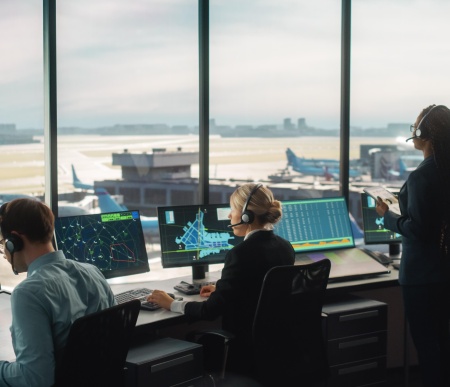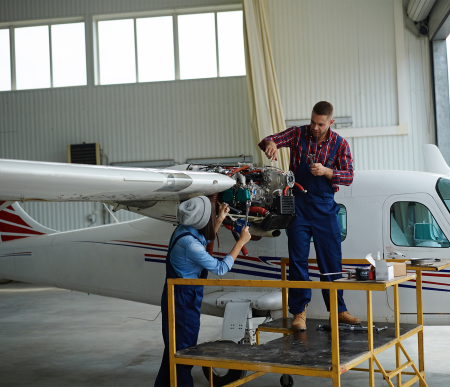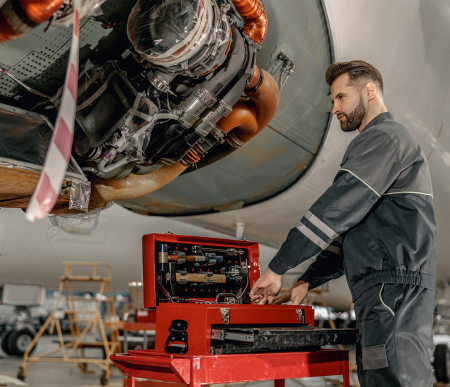Bachelor of Science (Honours) in Flight Operations
The Bachelor of Science in Flight Operations (BFO) prepares students for diverse roles in the aviation industry by providing a comprehensive education in aerodynamics, aircraft system, navigation, meteorology, aviation safety, flight planning, air traffic management, airlines and airport operations, air crash investigations, aviation project management, aviation economics analysis, and many more. Through hands-on training with advanced simulators and practical tools, students gain essential technical and soft skills, emphasising safety, regulatory compliance, and global aviation standards. Experienced faculty and strong industry connections offer valuable insights, wide choices and credible internships placement, and networking opportunities, enhancing employability in aviation industry. This program equips graduates with the expertise needed to excel in the dynamic and global aviation sector.


Entry Requirements
| STPM |
Pass with at least Grade C (GP 2.00) in any two (2) subjects; or |
|---|---|
| A-Level | Pass with at least Grade D in any two (2) subjects; or |
| Unified Examination Certificate (UEC) | Pass with at least Grade B in five (5) subjects and pass in Mathematics and English ; or |
| STAM | Pass with at least Grade of Jayyid (good) and pass in Mathematics and English at the Sijil Pelajaran Malaysia (SPM) level; or |
| Matriculation/Foundation |
Pass at least CGPA 2.00; or |
| Diploma (Level 4, MQF)/ Advanced Diploma (Level 5, MQF) |
Pass at least CGPA of 2.00 |
English Language Requirements* (for international student)
| MUET | Band 3.5 |
|---|---|
| IELTS | 5.0 |
| TOEFL (iBT) | 40 |
| TOEFL (ESS) | 7.5 |
| Linguaskill OL | 154 |
| Pearson | 47 |
| ELS | 107 |
*International students who do not fulfil the English Language Requirements may join the Intensive English Programme at Nilai University which builds their skills in the language and prepares them for the Linguaskill examination
Health Requirements
All offers are subject to the students being certified by a medical practitioner as fit to be accepted into the programme and not having any of the following medical / physical conditions:
• Colour Blindness
• Hearing Impairment
• Asthma
Programme Module
Common Core
- Technical Mathematics
- Aviation Physics
- Aerodynamics
- Human Factors
- Electrical Theory
- Electrical Theory I
- Aviation Legislation
- Law of Business
- Principles of Management
- Foundation of Business
Discipline Core
- Electrical Theory II
- Theory of Flight and Flight Controls
- Flight Simulator
- Aircraft Performance
- Meteorology
- Digital Techniques and Electronic Instrument Systems
- Instrument and Avionics Systems
- Aircraft Electrical Systems
- Aircraft Single-Engines System
Specialisation
- Airline Management
- Airport Management
- Dangerous Goods & Cargo Handling
- Air Navigation
- Aviation Safety
- Crew Resource Management
- Aircraft Accidents Investigations
- Project Management in Aviation
- Final Year Project I
- Final Year Project II
Electives
Elective I : Aviation Management
- Human Resources Management
- Business Ethics & Social Responsibility
- Air Transport Economics
- Air Traffic Systems
- Logistics Management
Elective II: Flight Management (Private Pilot Licence (PPL)
- Aviation Law
- Aircraft Operations Procedure
- Aircraft Technical and Type
- Visual Flight Rules Communications
- Flight Performance and Planning
Industrial Training
- Aviation Industrial Training
Mata Pelajaran Umum (Compulsory)
- Co-curriculum
- Integrity and Anti-corruption
- Penghayatan Etika Dan Peradaban (Malaysian Students) OR Bahasa Melayu Komunikasi I (International Students)
Malay Language (Only for Malaysian students without a credit in SPM BM)
- Bahasa Kebangsaan A
Programme Educational Objective (PEO)
The aims of the field are to equip students to become aircraft technologists who:
PEO 1
Demonstrate academic knowledge and creative thinking skills to become a proficient aviation industry personnel.
PEO 2
Display the quality of a competent flight operation personnel in aviation industry with hands on technical works skills experience independently.
PEO 3
Equip appropriate decision-making skills and interpersonal skills to meet the standards of the contemporary aviation work environment.
PEO 4
Adhere to professional codes of ethics and societal responsibilities to enhance sustainability of aviation industry.
Programme Learning Outcomes (PLO)
On completion of the programme, students will be able to:
PLO 1
Apply the science, mathematics, engineering and aeronautical management in the field of flight operations.
PLO 2
Analyse constructive information with creative and feasible solution in aviation.
PLO 3
Demonstrate in-depth technical skills to enhance professional competencies in flight operations.
PLO 4
Use digital technologies to solve problem critically with adherence standard operational guidelines to various issues in aviation field.
PLO 5
Analyse complex numerical data to resolve problem in aviation work environment.
PLO 6
Effectively deliver communications skills both verbally and in written manner on aviation application to stakeholders.
PLO 7
Demonstrate interpersonal skills in an adequate and formal manner.
PLO 8
Manage projects with good managerial qualities to assess the technical and business aspects of aviation industry.
PLO 9
Perform duties professionally, ethically and responsibly as an aviation personnel.
PLO 10
Demonstrate entrepreneurial mindset in delivering solutions towards achieving national aviation blueprint.
PLO 11
Apply skills and principles of lifelong learning in academic and career development.
Career Prospects
Here are some career options after you’ve graduated in Flight Operations:
- Flight Planner
- Air Traffic Controller
- Air Cargo & Logistics
- Piloting
- Load Master
- Flight Dispatcher
- Aviation Economist
- Aircraft Ground Handler
- Aircraft Accident Investigator
- Aviation Safety and Security Officer
- Aviation Quality Management Officer
Scholarship
Nilai University offers scholarships for students from various backgrounds, with the goal of helping students grow to be well-rounded and ambitious individuals and allowing them to reach their goals through quality education. We achieve this by combining academic excellence with a growth mindset for life-long learning.


